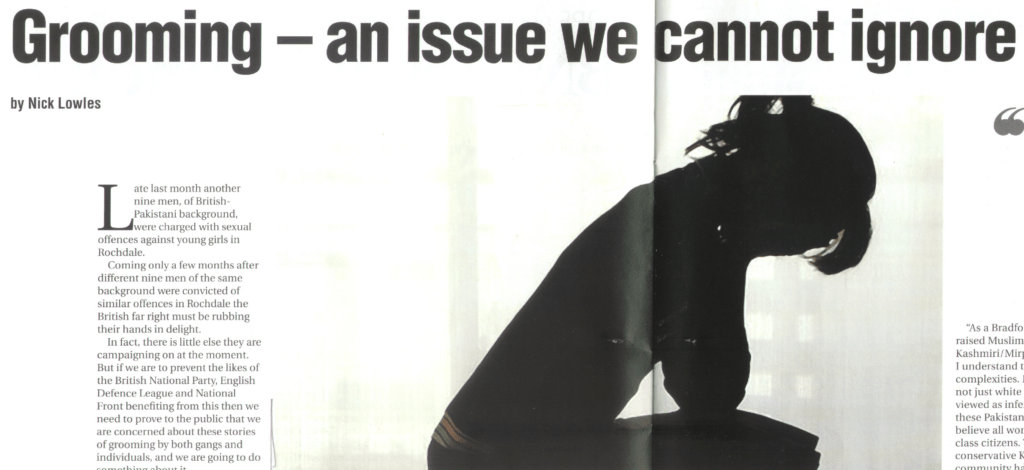AI Generated Summary
- Here, we provide a comprehensive timeline of events, highlighting key developments and the involvement of predominantly Pakistani-origin men in these heinous crimes.
- These trials highlighted the continued prevalence of Pakistani-origin men in these gangs, sparking outrage and far-right exploitation of the issue.
- The scandal recently resurfaced in public discourse following comments by Elon Musk, who criticized prominent UK figures like Sir Keir Starmer and Jess Phillips for their perceived roles in this ongoing tragedy.
The Pakistani grooming gangs scandal has become a profound stain on the UK’s criminal justice and social systems. It encompasses decades of systemic failure by authorities, cultural and political sensitivities overriding justice, and widespread child sexual exploitation. The scandal recently resurfaced in public discourse following comments by Elon Musk, who criticized prominent UK figures like Sir Keir Starmer and Jess Phillips for their perceived roles in this ongoing tragedy. Here, we provide a comprehensive timeline of events, highlighting key developments and the involvement of predominantly Pakistani-origin men in these heinous crimes.

Early Warnings Ignored: Foundations of the Scandal
- 2001: Names of taxi drivers allegedly involved in picking up girls from care homes in Rotherham for abuse are handed to police and local councils. Despite these warnings, meaningful action was delayed for nearly a decade.
- 2004: A Channel 4 documentary detailing claims of young white girls in Bradford being groomed by predominantly Asian men faced delays due to fears of inciting racial tensions. This pattern of suppression would characterize much of the scandal’s early history.
The First Convictions and Emerging Patterns
- 2010: Eleven men, predominantly of Asian origin, were convicted of child sexual exploitation in Derbyshire. This marked the beginning of public awareness regarding grooming gangs.
- 2011: Investigative journalist Andrew Norfolk persistently pursued reports of child sexual exploitation in Rotherham. Despite facing accusations of racism, his work would later prove pivotal in unveiling the broader scale of abuse.
- 2012: In Rochdale and Oldham, nine men were convicted for operating a child sexual exploitation ring centered around takeaways. These crimes had persisted since at least 2008, exposing a pattern of local businesses being used as hubs for abuse.
Intensified Investigations and National Reckoning
- 2013: The Alexis Jay report, commissioned in Rotherham, revealed the shocking abuse of 1,400 children between 1997 and 2013, predominantly by British-Pakistani men. This damning report catalyzed a national reckoning.
- 2014: Another inquiry revealed that police in Birmingham were aware of grooming gangs targeting children near schools as early as 2010 but chose not to act due to concerns about racial tensions.
- 2015: Operation Bullfinch in Oxford uncovered widespread abuse, with reports showing that 373 children had been groomed in the city. Thames Valley Police faced criticism for dismissing early complaints from victims.
Widening Scope and Ongoing Failures
- 2017-2018: In Huddersfield, 29 men were charged, with 20 convicted in 2018 for over 120 offences, including rape and sexual abuse. These trials highlighted the continued prevalence of Pakistani-origin men in these gangs, sparking outrage and far-right exploitation of the issue.
- 2020: The Home Office’s controversial report on grooming gangs concluded no specific ethnic group was disproportionately involved. Critics dismissed the report as a whitewash, claiming it ignored clear patterns of abuse by predominantly Pakistani men.
- 2022: A Telford inquiry revealed systemic failures, with over 1,000 children exploited and racial sensitivities discouraging teachers and youth workers from reporting incidents.
Renewed Public Outrage and Elon Musk’s Intervention
- 2023: High-profile comments by Elon Musk reignited public focus on the issue. Musk criticized Sir Keir Starmer, who led the Crown Prosecution Service (CPS) from 2008 to 2013, for alleged complicity during his tenure. Musk accused Labour’s Jess Phillips of shielding Starmer by refusing an inquiry into grooming gangs in Oldham.
- 2024: The scandal continued to unravel, with Operation Stovewood convicting 11 more men in Rotherham. This brought the total number of convicted individuals to 61 since 2010, further exposing a timeline marred by delays and systemic neglect.
The Role of Sir Keir Starmer and Institutional Failures
During his tenure as Director of Public Prosecutions (2008-2013), Sir Keir Starmer faced criticism for the CPS’s handling of grooming gang cases. The Rochdale grooming gang prosecution was initially dropped under the CPS, citing “unreliable” victims. Nazir Afzal, appointed by Starmer as chief prosecutor for northwest England, later reversed this decision, leading to successful convictions. Despite these actions, the broader systemic failures persisted.

The Conservative Party introduced the “Children’s Wellbeing and Schools Bill,” which the UK government stated was designed to protect children from exploitation. As part of the initiative, they called for a national inquiry into grooming gangs across the country. However, this inquiry could have delayed the bill’s passage and enactment, according to a report by the Press Association (PA).
The bill faced significant opposition in Parliament, with Labour MPs voting overwhelmingly against it. The motion was rejected by a margin of 364 votes to 111. Among those supporting the bill were 101 Conservative MPs, five from Reform UK, two from the Democratic Unionist Party (DUP), Jim Allister of the Traditional Unionist Voice, Robin Swann of the United Progressive Party, and Independent MP Alex Easton. Following the vote, the bill will now proceed for further review without requiring additional formal votes.
Societal Impact and Challenges Ahead
The Pakistani grooming gangs scandal has exposed deep flaws in the UK’s safeguarding structures, policing, and judiciary. While the ethnicity of offenders has been a contentious issue, evidence points to the exploitation of vulnerable girls by predominantly Pakistani-origin men. Cultural sensitivities and fears of racism accusations often paralyzed authorities, enabling prolonged abuse.

Recent government measures, such as the Grooming Gangs Taskforce, signal an attempt to rebuild trust and ensure accountability. However, public anger, fueled by influential voices like Elon Musk, underscores the lingering demand for justice and institutional reform.
This timeline serves as a sobering reminder of the consequences of prioritizing political correctness and bureaucratic caution over the safety of children. The UK must confront these failures head-on, ensuring the voices of survivors are heard, justice is served, and such atrocities are never repeated.




